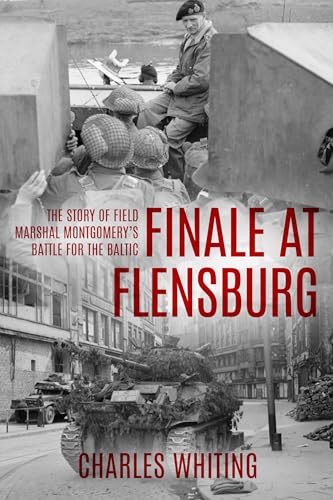
The overlooked story of one of the last battles of the Second World War, which shaped the course of the Cold War. Perfect for readers of Max Hastings, James Holland and Stephen E. Ambrose. By the spring of 1945 the end of World War Two was in sight. Adolf Hitler committed suicide on 30th April leaving Admiral Dönitz in charge of what was left of the crumbling Nazi state while Allied troops were storming into Germany from East and West. Yet, Field-Marshal Montgomery and Winston Churchill knew that this was not the moment to take it easy and wait for the inevitable collapse of their enemy, instead they looked to the future and saw the growing threat of the increasingly powerful and aggressive USSR. In the last remaining days of conflict, Montgomery and the British Army fought their way towards the Baltic coast in order to halt the advancing Russians from moving westwards into North-West Europe. This campaign began brilliantly, but finally ended in failure. Why did Dwight D. Eisenhower, who had previously been such a firm friend of the British, give only limited support to Montgomery and Churchill’s race to meet the Soviet advance? And how did this failure lay the groundworks for the Cold War that was to emerge in the aftermath of the Second World War? Charles Whiting’s thoroughly researched Finale at Flensburg is an eye-opening account of the dying moments of World War Two. Through interviews with many of the prominent German, American and British actors, Whiting is able to reconstruct this oft-forgotten battle and its aftermath.
Author

Charles Whiting was a British writer and military historian and with some 350 books of fiction and non-fiction to his credit, under his own name and a variety of pseudonyms including Ian Harding, Duncan Harding, K.N. Kostov, John Kerrigan, Klaus Konrad, and Leo Kessler. Born in the Bootham area of York, England, he was a pupil at the prestigious Nunthorpe Grammar School, leaving at the age of 16 to join the British Army by lying about his age. Keen to be in on the wartime action, Whiting was attached to the 52nd Reconnaissance Regiment and by the age of 18 saw duty as a sergeant in France, Holland, Belgium and Germany in the latter stages of World War II. While still a soldier, he observed conflicts between the highest-ranking British and American generals which he would write about extensively in later years. After the war, he stayed on in Germany completing his A-levels via correspondence course and teaching English before being enrolled at Leeds University reading History and German Language. As an undergraduate he was afforded opportunities for study at several European universities and, after gaining his degree, would go on to become an assistant professor of history. Elsewhere, Whiting held a variety of jobs which included working as a translator for a German chemical factory and spells as a publicist, a correspondent for The Times and feature writer for such diverse magazines as International Review of Linguistics, Soldier and Playboy. His first novel was written while still an undergraduate, was published in 1954 and by 1958 had been followed by three wartime thrillers. Between 1960 and 2007 Charles went on to write over 350 titles, including 70 non-fiction titles covering varied topics from the Nazi intelligence service to British Regiments during World War II. One of his publishers, Easingwold-based Rupert Smith of GH Smith & Son said he was a quiet man and prolific writer. "He's one of a band of forgotten authors because he sold millions of copies and still, up to his death was doing publishing deals.He was the kind of man who was very self-effacing, one of Britain's forgotten authors, still working at 80 years of age, with his nose down and kicking out books." Charles Henry Whiting, author and military historian died on July 24 2007, leaving his wife and son.